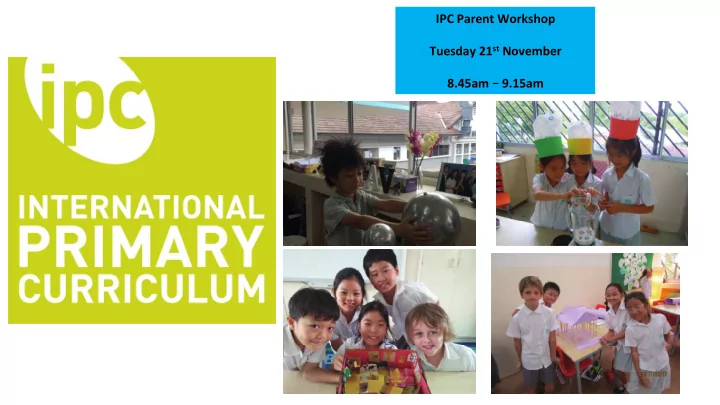

!"#$"%&'()$*+&,-.+/$ $ 01'-2%3$45 -) $6+7'89'&$ $ :;<=%8$ – $>;5=%8$
?1'-@+(A$ "#$%!&'!(')!%#*+,!$-.!%#.!%'/!0!1'2%!*1/'-%$+%!$3-*4)%.2!(')! 5')6&!5$+%!(')-!7#*6&!%'!&.8.6'/!&)-*+9!%#.*-!:-*1$-(!27#''6!7$-..-;!! <.7'-&!(')-!$+25.-2!'+!%#.!1$9*7!5#*%.4'$-&!$+&!7*-76.!(')-!%'/!7#'*7.=! The IPC extends knowledge, skills and understanding, develops personal attributes and supports an international perspective in a way that responds to revised ideas about learning ! IPC units are organised around a theme, which helps children to see how subjects are both ‘independent’ and ‘interdependent’ enabling them to see ‘the big picture’ of their learning, make connections through and across different subjects, and talk about a theme from multiple perspectives. !
What is the IPC? • A philosophy (what we believe) • A pedagogy (an approach to teaching and learning) • A process (which honours how children learn best in this age group) Our philosophy, pedagogy and process are aimed at improving children’s learning .
Fast facts • Includes over 130 thematic units • Taught in over 90 countries • International schools • UK state schools and academies • Dutch national schools • Special Education schools • Shell schools • British Schools of America
The Programmes • Main Programme: Milepost 1 (5-7 years) Milepost 2 (7-9 years) Milepost 3 (9-12 years) • Assessment for Learning Programme • Specialist Skills Programmes (Art, Music, PE, ICT & Computing)
Academic Learning The IPC Subject Learning Goals are the foundation on which the IPC was built. The learning goals cover the knowledge, skills and the understandings that children will develop. Knowledge Skills Understanding What children will What children will What children will know be able to do understand
Assessment for Learning It isn't enough to assume that children are learning. We need some way of measuring improvements in learning. Our programme supports teachers in assessing, and children in self-assessing, their progress with key skills from the IPC Learning Goals. It provides: • specific skills assessment for Mileposts 1, 2 and 3 • a system that provides learning advice • a rubric (success criteria) for teachers and children • tracking through beginning , developing and mastering
Sample Teacher Rubric Beginning Developing Mastering The child can make a The child independently The child independently simple map or plan with produces a map with produces a map with some identifiable three or more most features in the features in pictorial identifiable features in correct position relative form. correct relative to one another. positions. The features are not in They use symbols their correct relative Features may be shown rather than pictures to positions. as pictures or symbols. identify features and may include a simple key.
!!!!"#$!%&'!($)*#+,-!.(/0*(0/$!!!!!!!!!!!!!!!!!!!!!!!!!!!!!!!!!!!!!!!!!!!!10/!%&'!2!3$)/,+,-!45)6.!!7
Entry Point • Wow factor! • Motivation for learning – the hook • Inspire learning through passion for The Magic Toymaker the theme – Milepost 1 • Makes learning fun Circus Unit – Milepost 1 Chocolate unit – Milepost 2 Investigators – Milepost 3
The Knowledge Harvest • What do children already know? • Helps to make connections with previous learning
Explaining the Theme • Gives children the ‘big picture’ of their learning • Shared with parents at the start of a unit to help support the learning at home
Researching and Recording Each IPC unit has a research activity and a recording activity. Research activities always precede the recording activities. During research activities, children use a variety of methods and work in different group sizes to find out a range of information. During the recording activities , children interpret the learning they have researched and have the opportunity to demonstrate, share and explain their learning in different ways.
Exit Point – when the learner becomes the teacher! The exit point has two main purposes: to help children pull together their learning from the unit and to celebrate the learning that has taken place. Mission to Mars - Milepost 3 Pictures, Paintings and Photographs - Milepost 2 16
>:?!*+!@7A'+!$%!! B?>CD!E*6.:'2%!F!
>:?!*+!@7A'+!$%!! B?>CD!E*6.:'2%!G!
>:?!*+!@7A'+!$%!B?>CD!E*6.:'2%!0!
>:?!&*2/6$(2!$7-'22!%#.!27#''6!
Recommend
More recommend